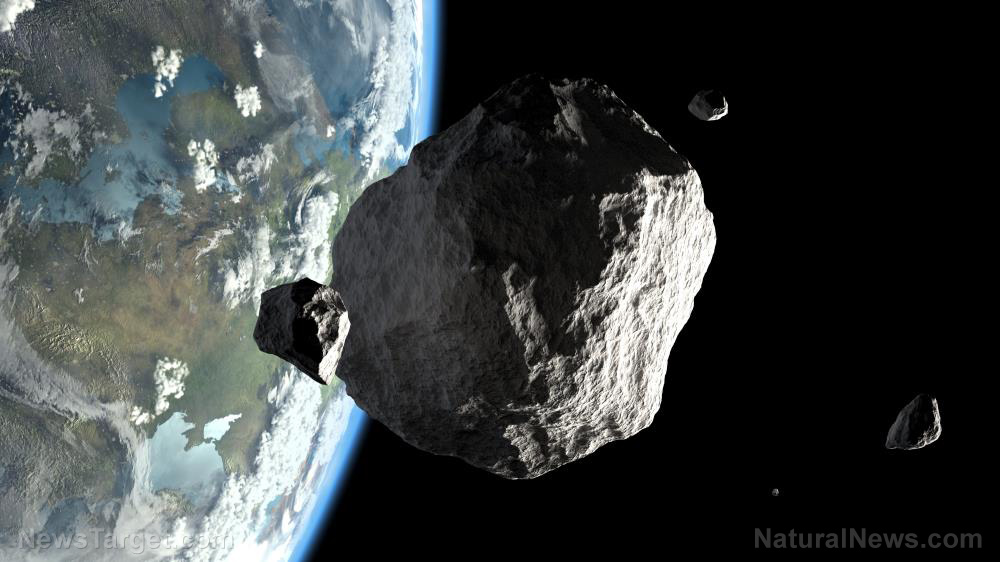(Natural News)
Five asteroids flew close to Earth this week, according to the National Aeronautics and Space Administration (NASA). NASA detected the space objects only within the month, leaving little room for errors in calculating their trajectories.
Two of the asteroids made their closest approach to the planet on Monday, August 24, while another two made their closest approach on Wednesday, August 26. The remaining asteroid dipped closest to Earth on Thursday, August 27.
They ranged from the size of a regular commercial aircraft to a house. But due to their safe distance from Earth, authorities said that the asteroids were nothing to be concerned about. They are now barreling deeper into space and away from the planet.
Asteroid impacts threaten Earth
Asteroids pose one of the greatest safety risks to humanity. While the likelihood of a massive space object hitting Earth is low, space agencies are prone to make errors when it comes to forecasting meteorite impacts.
Just this month, an SUV-sized asteroid flew past Earth and broke the record for the closest asteroid flyby in recorded history. But it was only detected by astronomers six hours after its nearest approach at 1,830 miles.
On the other hand, three of the five asteroids that came close to Earth this week were detected only about two weeks before.
The closest of all five flybys was detected 12 days before the asteroid’s closest approach. Asteroid 2020 FF3 was the size of a small airplane at 85 feet and flew closest to the planet at 1.5 million miles.
Meanwhile, this Monday’s flybys were detected 13 and 9 days ago. Asteroids 2020 PP3 and 2020 PJ6 were both the size of an airplane at 110 and 85 feet, respectively. They flew closest to Earth at an average distance of 3.55 million miles.
Early detection of meteorite impacts and asteroid flybys is important as it greatly informs hazard planning and preparation. This became even more evident after the Chelyabinsk impact of 2013.
On the morning of February 13, a house-sized meteorite hit the Russian city of Chelyabinsk. The disaster left more than 1,600 people injured and shattered windows near the impact site. According to NASA, the Chelyabinsk meteor traveled 11 miles per second and released an energy equivalent of about 440,000 tons of TNT upon landing. The blast sent shockwaves that rippled through 200 square miles of land area. Many of the injuries were caused by broken glass. (Related: Asteroid strike near New York City would kill 2.5 million people, reveals physics simulation based on NASA data.)
Upcoming asteroid flybys
There is currently no known asteroid that poses a major threat to Earth. But NASA and other agencies worldwide are constantly monitoring space for signs of a massive meteorite impact.
For one, NASA’s Jet Propulsion Laboratory has an active “Asteroid Watch” that monitors the five next asteroids that will approach Earth within 4.6 million miles.
The lab is expecting two asteroid flybys on September 1 this year. An 80-foot asteroid is projected to come within the planet at less than two million miles while a 92-foot asteroid will come within 75,400 miles.
One asteroid flyby is already gaining buzz ahead of its November schedule. Billed as the “election day asteroid,” asteroid 2018VP1 is estimated to come within 3,103 miles of Earth on November 22, 2020. There’s also small chance that it will enter Earth’s atmosphere on November 2, the day before the U.S. presidential election.
But it’s not going to pose a major risk if it does enter the atmosphere. According to NASA, asteroid 2018VP1 is only about 6.5 feet in diameter and will likely burn up as it enters the atmosphere.
Astronomers knew about 2018VP1 for years since its discovery in 2018. The asteroid makes a complete orbit around the Sun every two years and is currently on its way for another orbit, passing through Earth.
Space.news has more on imminent asteroid flybys.
Sources include:
